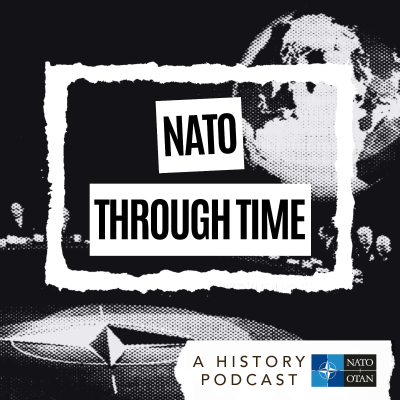
NATO Through Time
English
History & religion
Limited Offer
2 months for 19 kr.
Then 99 kr. / monthCancel anytime.
- 20 hours of audiobooks / month
- Podcasts only on Podimo
- All free podcasts
About NATO Through Time
Why were there 12 founding NATO members? What is Article 5, and why was it only invoked once in all of NATO’s history? Why wasn’t NATO dissolved like the Warsaw Pact after the Cold War ended? The NATO Through Time podcast features diverse voices from NATO member countries – including former Presidents, Prime Ministers, Foreign and Defence Ministers, military officers, NATO officials, historians, journalists and young citizens – answering these questions and reflecting on NATO’s past, present and future.
All episodes
11 episodesNATO 2099 with Dr Florence Gaub
How can we accurately predict future events? How do we persuade political leaders to look beyond the next couple of years? What lies ahead for NATO, in the coming years and in the distant future? In this episode, researcher and futurist Dr Florence Gaub walks us through her work as a strategic foresight advisor. As Director of the Research Division at the NATO Defense College in Rome, she leads a team that looks for “weak signals” of future events, helping ensure that NATO policymakers are prepared to respond to even the most unlikely scenarios. To celebrate NATO’s 75th anniversary year, she also led the creation of the NATO 2099 graphic novel, looking ahead at the next 75 years of NATO and imagining what the world might look like on NATO’s 150th anniversary.
NATO's newest members with former President of Finland Sauli Niinistö
What is the difference between NATO members and partners? Why did Finland and Sweden set aside decades of neutrality and apply for NATO membership in 2022? What can Finland’s experience living next-door to Russia, and its 900,000-strong reserve forces, teach the rest of the Alliance? In this episode, Sauli Niinistö, who served as President of Finland from 2012 to 2024, talks about Finland’s experience of military non-alignment for more than seven decades, including almost 30 years of NATO partnership. He walks listeners through Finland’s decision to apply for NATO membership alongside Sweden in 2022, and the process of transitioning from NATO partner to NATO member. He also speaks about his role as a Special Adviser to the European Union on strengthening Europe’s civil and military preparedness and readiness, and what Europe needs to do to boost its resilience against growing hybrid threats.
NATO's missions with General Jennie Carignan
Why does NATO conduct missions outside of its territory? What were the different aims and lessons learned of NATO’s missions in Bosnia and Herzegovina, Afghanistan and Iraq? What is Canada’s role in a transatlantic alliance that is often framed as a balancing act between the United States and European Allies? In this episode, General Jennie Carignan, Chief of the Defence Staff of the Canadian Armed Forces, walks us through her distinguished military career. She served on a demining team during a peacekeeping mission in Bosnia and Herzegovina, led an engineering regiment during a combat mission in Afghanistan, and was the first woman to lead a NATO mission when she took command of the advisory and capacity-building mission in Iraq in 2019. She also reflects on Canada’s role in NATO, including its contributions to the Alliance’s forward presence in Latvia, and her place in history as the first woman to lead Canada’s military.
NATO’s open door (2009) with former President of Croatia Kolinda Grabar-Kitarović
What was it like learning about NATO while growing up in the former Yugoslavia? Why did NATO launch “out-of-area” operations in the Western Balkans following the breakup of Yugoslavia in the 1990s? What was the road to NATO membership like for Albania and Croatia, and how did these countries help pave the way for other countries in the region to join the Alliance? In this episode, former President of Croatia Kolinda Grabar-Kitarović reflects on her country’s journey to independence and its decision to “rejoin the European family” by becoming a member of NATO and the European Union. She also speaks about how Croatia has helped other countries in southeast Europe join the Alliance, and how this experience will support the future membership of further countries, including Ukraine. In addition to serving as President of Croatia (2015-2020), she was also the country’s Minister of Foreign Affairs and European Integration (2005-2008), Ambassador to the United States (2008-2011) and NATO’s Assistant Secretary General for Public Diplomacy (2011-2014), so she played a crucial role in bringing Croatia into NATO and in its early years of membership in the Alliance.
9/11 and Article 5 with former NATO Secretary General Lord Robertson
How is Article 5 of the North Atlantic Treaty triggered, and what happens once it’s activated? How did the 9/11 terrorist attacks impact both the United States and its NATO Allies, and why did NATO respond the way it did? What was the significance of NATO’s operations in Afghanistan and how did they change the Alliance? In this episode, former NATO Secretary General Lord Robertson of Port Ellen shares his memories of 11 September 2001, and the historic months and years that followed, including the declaration of Article 5 of the North Atlantic Treaty and beginning of NATO operations in Afghanistan. He also discusses the difference between Allies’ involvement in Afghanistan and Iraq, the optimism for NATO-Russia relations in the early 2000s, and advice he would give to the incoming Secretary General.
Choose your subscription
Limited Offer
Premium
20 hours of audiobooks
Podcasts only on Podimo
All free podcasts
Cancel anytime
2 months for 19 kr.
Then 99 kr. / month
Premium Plus
Unlimited audiobooks
Podcasts only on Podimo
All free podcasts
Cancel anytime
Start 7 days free trial
Then 129 kr. / month
2 months for 19 kr. Then 99 kr. / month. Cancel anytime.























